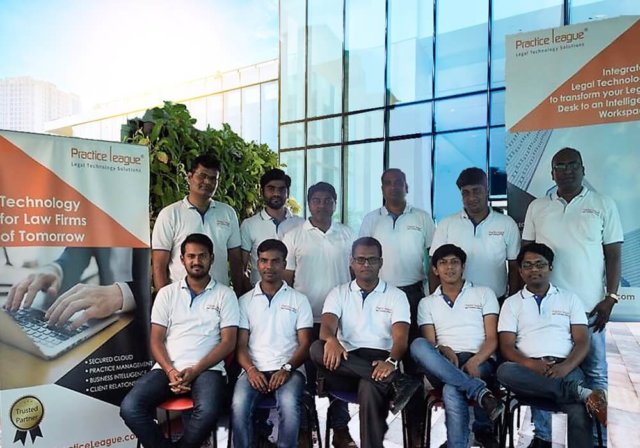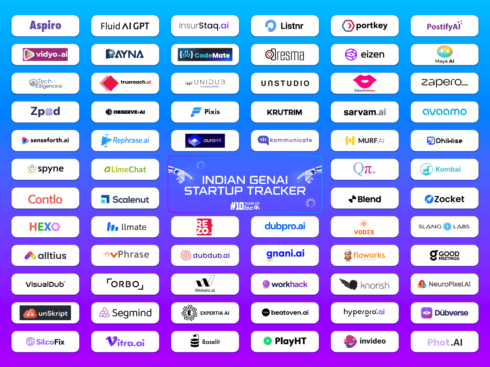SUMMARY
AI-Based Legaltech Startup PracticeLeague May Soon Offer Blockchain-Enabled Smart Contracts On Its Platform
If there is one sector in India that could do with technological disruption, it’s legal and judicial services. But while other sectors have witnessed increasing adoption of technology and automation — for instance there’s SAP for manufacturing, CRM for sales, etc — most Indian lawyers are still dependant on folders, hard disks, and flash drives.
According to the latest statistics obtained from National Judicial Data Grid, there were over 4.2 Mn cases pending across 24 high courts of India as on 4 February, 2018, with 49% of these cases being more than five years old.
A large number of these cases are corporate and economic ones, whose pendency reduces the ease of doing business and acts as a major barrier for investments to India. The Economic Survey 2017-18 emphasised on the importance of an effective, efficient, and expeditious contract enforcement regime for economic growth and development. Although India jumped to the 100th rank in the World Bank’s Ease of Doing Business Report 2018, it continues to lag behind in the enforcing contracts indicator at 164 out of 189 countries.
However, software penetration to ease the judiciary process is extremely low in India’s legal sector. Legal professionals have time and again felt the need for a technology-infused system to save litigants’ cost, time, and resources.
Parimal Chanchani, co-founder of legaltech startup PracticeLeague, says, “Over 70% of standardised work, or work that has been done earlier in legal departments, is being repeated in making contracts, agreements, etc.”
With an aim to disrupt the legal space, Chanchani, Praveen Kulkarni, and Shubhada Chanchani founded PracticeLeague, an artificial intelligence (AI)-enabled B2B legaltech startup, which provides a complete stack-based cloud model platform for law firms and enterprises.
“We have a complete stack-based cloud model to which law firms can subscribe. Once they sign up on our platform, they can upload relevant documents and files of cases they are undertaking and can maintain all the information related with the cases on the cloud,” explains Chanchani.
PracticeLeague: Leveraging AI In Judicial Services
PracticeLeague designs AI and machine learning-based legal technical solutions for law firms and enterprise legal departments.
Chanchani explains the process: Once the user uploads the scanned cony of the contract/agreement on the system, an optical character reader (OCR) tool converts it into an editable document. Then IBM Watson — the AI technology used in the platform — then extracts the data, summarises it, and analyses the contract.
“This helps law firms and legal departments of enterprises to assess how risky it is to take up the contract, what kind of changes are needed in the clauses, etc. The platform analyses previous similar contracts that have been undertaken by the firm. The more contracts the AI analyses, the more intelligent it gets,” he says.
All important emails, client communication, legal documents, drafts, and contracts are stored in a single server in an encrypted form, and are accessible only to the people authorised to work on it, the founder says.
There are more than 40 law firms and 20 enterprises globally using the PracticeLeague platform. Apart from India, the startup claims to have clients from Hong Kong, Vietnam, Spain, Mauritius, Thailand, Mongolia. Its clients in India comprise 95% of its total users on the platform. “There are more than 10,000 lawyers using our platform globally,” says Chanchani.
PracticeLeague charges $730-$1.4K (INR 50K to 1 Lakh) and $73K (INR 50 Lakh) per year from law firms and enterprises, respectively. For the year ending on March 2018, it generated revenues of over $1 Mn, the founder claims.
So, what has been the biggest hurdle in automating the legal services process for PracticeLeague, Inc42 asked, “To make law firms and legal enterprises understand the gap and introduce them to technology has been the biggest challenge. Our users continue to give their feedback as they use the software,” Chanchani replies.
Making Money Through Client References
The Pune-headquartered PracticeLeague was founded in 2014. Its founders have many years of experience in the IT services sector, where they used to work on developing lending platforms, delivery systems, etc. The founders infused about $500K in developing its platform for legal services, which is a domain expertise-driven market.
The bootstrapped startup launched its software solution in mid 2016. Now, it has 55 employees working across its offices in Pune, Mumbai, Delhi and Bengaluru. PracticeLeague has a Product Excellence Team, which is focused on improving quality, security, and scalability of the solution, while its product development department addresses the changing needs of the market and keeps the platform up to date.
The startup says that its stream of monetisation comes through ‘references’. Chanchani says, “When we approach a law firm to sell our solutions, they refer us to enterprises looking for similar solutions. The enterprises, in turn, refer us to lawyers looking to automate their dealings.”
PracticeLeague plans to raise funds from Hong Kong-based investors where it wants to expand within the next two months, with the aim of slowly entering other Asia-Pacific countries.
It is also exploring ways to infuse blockchain technology to ensure legal contracts can be executed automatically.
“Blockchain-enabled legal contracts will based on smart contracts. Based on the terms of the contract put on a blockchain, the contract will be attributed automatically without anyone interfering in it,” Chanchani said. Smart contracts, essentially, are pieces of code that allow for an action to take place once a specific condition is met. They enable people to exchange money, property, shares, or anything of value in a transparent, conflict-free manner while avoiding the services of a middleman.
PracticeLeague is exploring Microsoft Azure Blockchain and Ethereum to build sophisticated obligation management into its Contract Management Lifecycle solution, aimed at preserving the interest of all contracting parties.

PracticeLeague has employees working across four offices in India
India’s legaltech space is witnessing the emergence of an increasing number of players. For instance, there are companies such as Chennai-based Vakilsearch, which connects clients to lawyers; MyAdvo, which helps its clients connect to lawyers for their legal needs; and LawRato, which provides expert legal advice and counsel to enterprises and individuals.
Over the years, Indian startups have started providing AI-enabled case-law research tools driven by summarisation algorithms coupled with machine-learning algorithms for ranking and showing the most relevant cases on the platform. With the use of AI systems, a law firm that spends roughly 30%-40% of its time on non-client (non-core) activities, will now spend only 5%-10% time on such activities.
Offering AI solutions similar to PracticeLeague, there is SpotDraft, which helps small businesses and freelancers draft contracts, send automated invoices, and reminders. Further, there is the virtual legal research assistant, CaseIQ, developed by Aniruddha Yadav to automate mundane tasks that are currently carried out mostly by lawyers.
According to the Legal Service Global Market Report 2018 by Business Research Company, the global legal services market size as of 2017 was valued at $848 billion in 2017. PracticeLeague anticipates the total addressable legaltech market size for India to be upwards of $30 Bn.
With startups like PracticeLeague looking to disrupt the legal system with technology and law firms and lawyers automating their legal services, the country’s judiciary system may too eventually be compelled to adopt similar technology and modern tools. And this can only bode well for the judicial services as well as for the economy, which will benefit from the clearing of pending commercial cased.



























